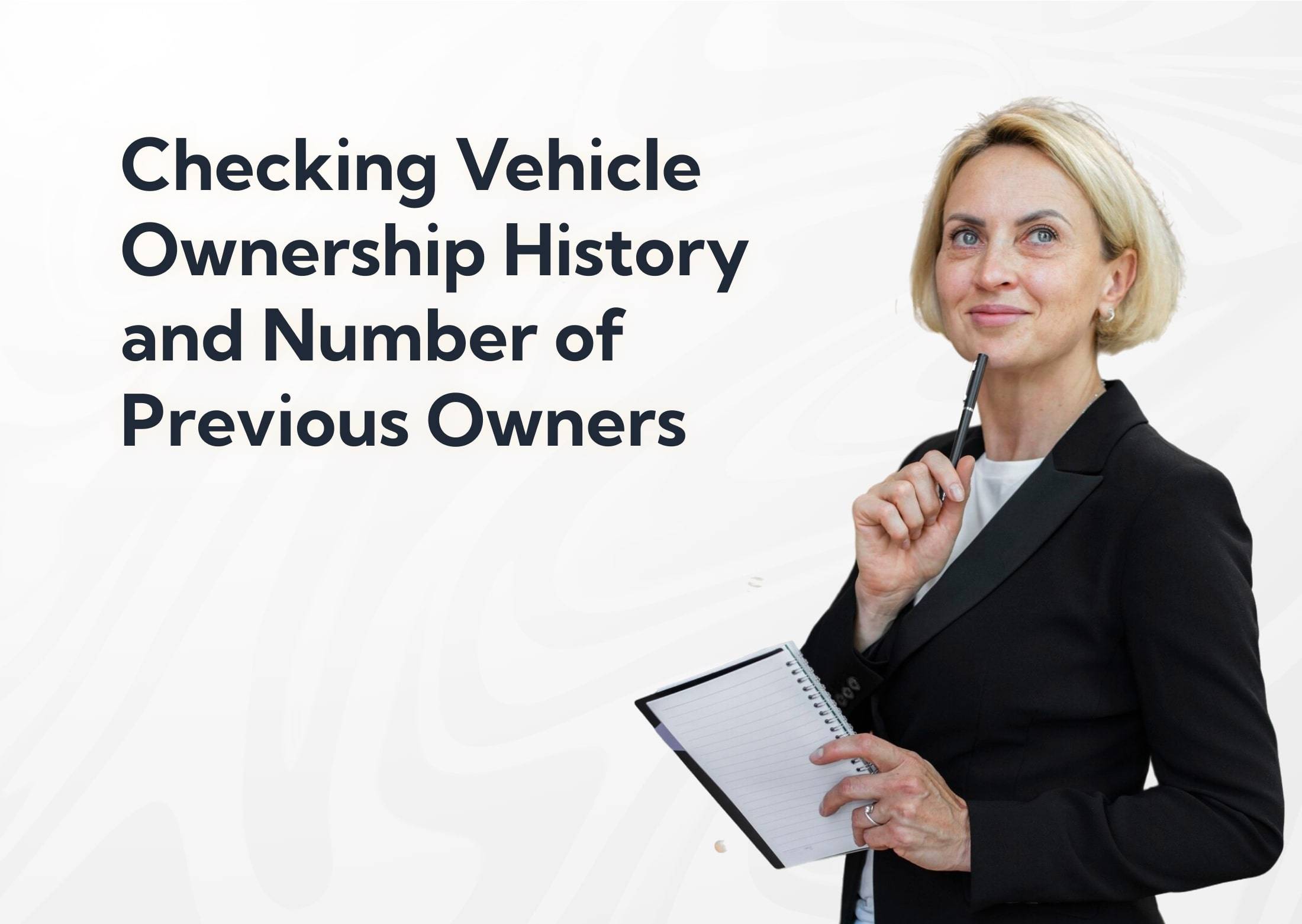Checking Vehicle Ownership History and Number of Previous Owners
Want to know how many people have owned a car before you? In the UK, checking a vehicle’s ownership history is simple with DVLA records and logbook details. This guide explains the process step by step so you can spot red flags, verify sellers and buy with confidence.
Last updated: 13th October, 2025

Award-winning CEO driving growth and social impact across automotive, recycling, and technology-led enterprise platforms.

Listen to this story
When you're buying a used car, ownership history is one of the most important considerations. The more owners a car has had, the higher the chance its maintenance and repair history is unclear or incomplete. At some point, the number of previous owners raises a red flag.
Ownership also tells you about the car's usage, whether it was involved in an accident, and if it has a clean title.
Luckily, checking the ownership history and number of previous owners is pretty straightforward. If you're seriously considering buying a used car, don't complete the transaction without verifying these details first.
What's in this article
- 1. What the number of owners means for a vehicle
- 2. What's the fastest way to find out how many people have owned a car?
- 3. Checking the number of previous car owners online
- 4. Is there a fee to access a car's ownership history?
- 5. How accurate are online databases for car history checks?
- 6. How long does it take to receive a full ownership history report?
- 7. Can I find out how long each owner had the car?
- 8. Documents required to check a car's ownership history
- 9. Do dealerships provide ownership history during the sale?
- 10. Final thoughts
What the number of owners means for a vehicle
It might not cross your mind immediately, but the number of previous owners a vehicle has had has serious implications for several aspects of the car — how it was maintained, its value, and even buyer confidence.
Maintenance and care
A car with fewer previous owners is generally better maintained.
Think about it this way: the longer one person has owned a car, the more likely they are to have invested in its maintenance and upkeep. And no two drivers will have the same ownership habits. So, the more owners, the more opportunities for at least one owner to neglect maintenance.
In my 40 years’ experience in the motor trade, this principle only gets truer and truer the older the car gets. If you're buying a car less than 4 years old, you won't usually have much to worry about in terms of maintenance, regardless of the number of owners. If it's creeping past that 5-year threshold, it pays to be a bit more vigilant.
TL;DR: Multiple owners can signal varied maintenance habits and potentially inconsistent care.
Buyer confidence
Single-owner cars tend to inspire more confidence among buyers. It's easier to track the vehicle's history and get comprehensive service/maintenance records when you only need them from one owner.
If you're selling your car, it'll be a lot easier to move out of your hands if you're the only one who's owned it. Not to mention, you'll fetch a higher sale price.
Resale value
Whether you're buying or selling, ownership history will 100% come up in the negotiation. If you're a smart seller, you'll emphasize the transparency and reliability of your one-owner car. If you're a savvy buyer, you'll use the unknowns associated with multiple owners as a bargaining chip to reduce the sale price.
Usage patterns
The number of owners gives insights into the car’s usage. For example, cars with multiple owners might have seen varied driving conditions, such as city driving versus highway driving, which can affect wear and tear differently.
Red flags
Rapid changes in ownership (e.g. multiple times in less than a year) suggest the car has ongoing issues each owner wanted to avoid. It’s crucial to investigate the reasons for frequent ownership changes and scrutinise the car’s service and repair history closely.
What's the fastest way to find out how many people have owned a car?
If you have access to the physical document, the fastest and simplest way to check ownership history is to refer to the V5C logbook. This provides details about the current and previous registered keeper of the vehicle, as well as the number of previous owners.
In the "Special notes" section, it may also show you the number of total registered keepers and whether the car was declared "new" at its first registration.
However, there are a few limitations with this option.
- Missing information. Since the V5C only shows info about the current and previous owner, it doesn't help as much for cars with 3+ owners.
- Forgery. It's not unheard of for sellers to falsify the V5C logbook, though it's still rare.
- Lost documents. The seller may be selling their car without a V5C because they lost or misplaced their logbook.
Also keep in mind that the V5C is not evidence of legal ownership. It simply shows the registered keeper, who may or may not be the legal owner.
Checking the number of previous car owners online
If you don’t have access to the physical V5C, getting an online vehicle history report is easy and convenient. And it’s the best way to learn everything about the car’s history, not just the number of previous owners.
Provided you have the information handy, you can do this from the comfort of your home.
Before you begin, all you'll need is the vehicle registration number (VRN) — also called the number plate. If you can get the vehicle identification number (VIN) as well, you can do a more comprehensive check.
In addition to the number of previous owners, you'll be able to see:
- Outstanding finance/loans on the car
- Service history
- MOT history
- Write-off status
- Mileage discrepancies
- Stolen vehicle check
- V5C/VIN match
- Whether it's been scrapped by the DVLA
- Dozens of other data points
There are several sites that offer these checks, including the AA and the HPI® Check.
The main limitation to online checks is they don't tell you who those owners were (due to UK data privacy laws). So it's wise to combine the above resources with a thorough visual inspection and full service history check. If you can, take it to a mechanic as well.
What the experts say

Anthony Sharkey
Is there a fee to access a car's ownership history?
Yes. The fee to access a car's ownership history depends on the exact type of report you choose. For instance, the AA's service charges £14.99 for a single vehicle history check or £29.99 for a multi-check.
On the other hand, the HPI® Check has different levels with varying costs:
- Basic Check for £9.99
- Standard Check for £19.99
- Comprehensive Check for £29.99
If all you need to know is the number of previous owners, the Basic tier has you covered. If you also want to know the rest of your car's history, use the Standard or Comprehensive tier.
How accurate are online databases for car history checks?
Online vehicle history check services source their data from the DVLA, Police National Database, and several other reputable sources. HPI, for instance, will guarantee you up to £30,000 in case they get anything wrong.
While no database is 100% faultless, it's safe to say that the data you receive will be very reliable (otherwise, why would they put £30k up?).
Does the ownership history show if the car was ever leased?
The V5C document shows the registered keeper of the vehicle, not necessarily the owner. If the registered keeper is a person but the owner is a company, that could mean that the car was used as a lease or fleet vehicle.
Detailed vehicle history reports from services like HPI Check occasionally indicate if the car was used as a fleet vehicle or had outstanding finance, plus the lender and type of agreement. Finance companies are one source of these services' data.
If the car was under a leasing agreement, the company may have indicated so. And if that's the case, it would show up in the report.
Note: While these indicators suggest a car was leased, the exact nature of previous use (leased, owned, rented, etc.) might not be directly specified in ownership history records. For absolute clarity, you’ll need to ask the dealer directly or look for documentation that came with the car that explicitly mentions leasing.
How long does it take to receive a full ownership history report?
Most of the reputable online vehicle history report services deliver instant reports. After entering the vehicle’s registration number and making the payment, you usually receive the report as a PDF within minutes.
If you opt to request information directly from the DVLA using form V888, the process can take longer. According to the DVLA, it can take up to a few weeks to receive the information, as it involves processing and mailing the details.
It’s important to mention that complete vehicle ownership information is closely protected by data protection laws. You can only access the DVLA’s full ownership history (which includes names and addresses of all registered keepers) with “reasonable cause”. Unfortunately, that doesn’t include considering that car for purchase.
Can I find out how long each owner had the car?
In addition to all of the above, vehicle history reports tell you how long each driver owned the vehicle and the total mileage they drove. This is how they pinpoint mileage discrepancies, which might indicate clocking/cut-and-shut.
Documents required to check a car's ownership history
To verify a car's ownership history, you don't necessarily need anything besides the number plate. If you have the V5C logbook for the vehicle in question, you can verify basic ownership information for free. But, with a number plate, you can use an online service to get far more detailed information.
Do dealerships provide ownership history during the sale?
By law, dealers in the UK must tell you the number of owners a vehicle has. However, they legally cannot give you information about who the actual owners were.
If it's revealed there were several owners (especially over a short time period), you can use that as leverage when haggling with the dealer.
Since dealers are in the business of selling cars and, therefore, strive to provide the best customer experience, they'll probably provide other information as well.
- Service records
- Previous damage or repairs
- Accidents and insurance claims
- Enquiries with the manufacturer to determine recalls or other faults
If any of these issues also come up, you have more context as to why there could have been multiple owners. By extension, you have even more leverage to drive down the price.
Final thoughts
There are plenty of low-cost and convenient ways to check the number of previous owners a vehicle has.
While knowing that number is one part of a car's history, it doesn't tell the whole story. You have to thoroughly inspect the car and check for service records before going through with the transaction. Don't leave anything up to chance, especially when it comes to used cars.
About Car.co.uk

Share on
Latest news & blogs










